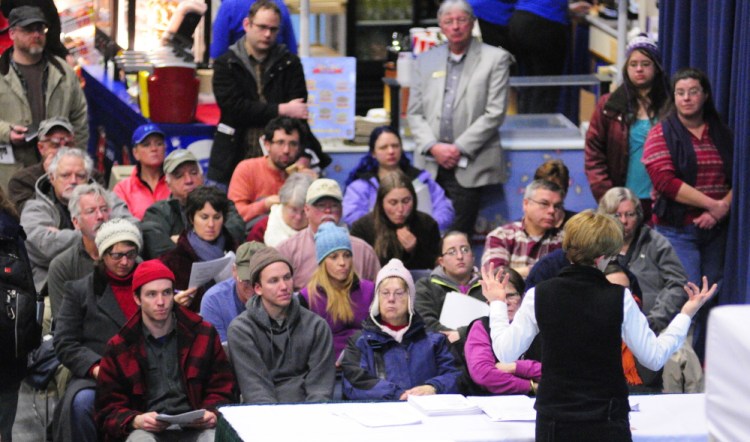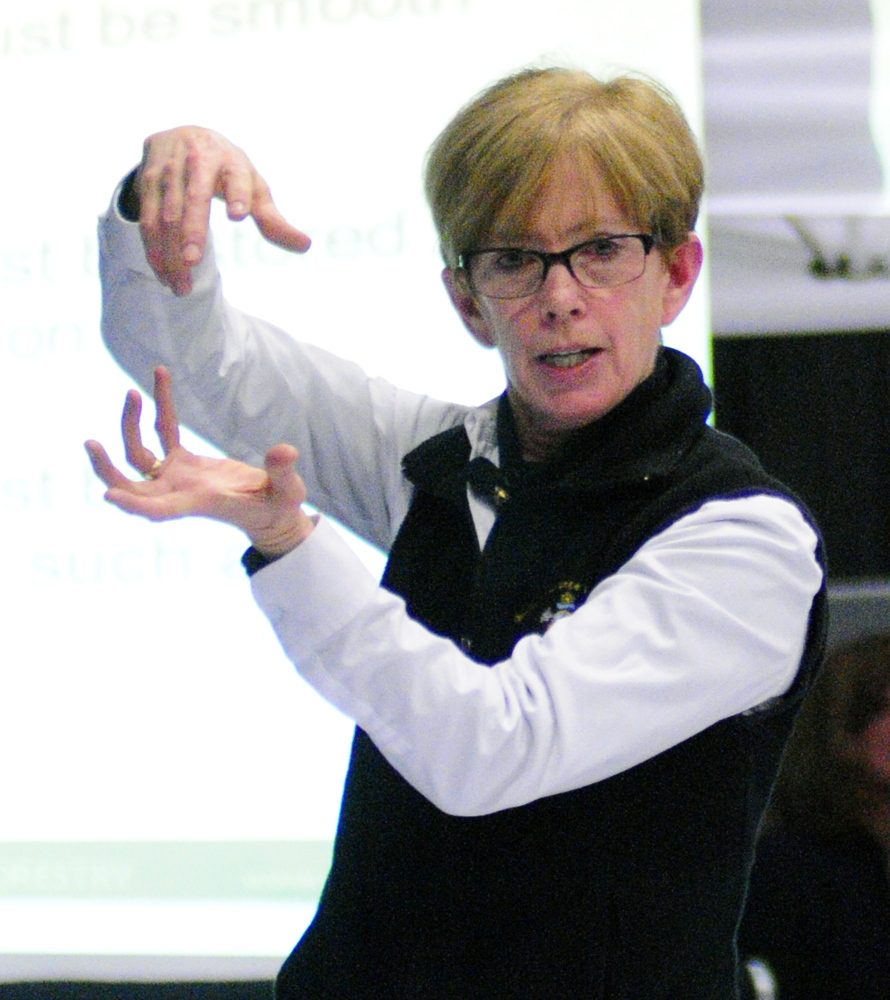AUGUSTA — Ronda Stone made the process of gaining a home food processing license as simple as learning the ABCs.
Stone, consumer protection inspector in the quality assurance and regulations area of the Maine Department of Agriculture, Conservation and Forestry, gave tips for starting a successful home food business to about 40 people Wednesday afternoon in one section of the Maine Agricultural Trades Show at the Augusta Civic Center.
The audience sat rapt, many taking notes. Stone said many more people are interested in buying food made locally, and that has spurred an increase in those wanting to fill that need.
“Collectively you are a force to be reckoned with,” she told them.
Jackie Frost, who operates Butting Heads Farm in Gardiner, already makes soap from the milk of her three milking goats, and now she’d like to produce food for sale.
“I want to have a licensed kitchen,” Frost said, as she waited for the demonstration to begin. “I want to sell jellies and preserves and goat milk caramel called ‘cajeta,’ and I also want to be able to maybe sell beans on Saturday night.”
She came to gather information on kitchen requirements and the licensing process.
Chris Bozak, of Berry Best Farm in Lebanon, wanted a refresher. She already has a licensed kitchen in her home, where she produces jam from the farm’s own fruit: blueberry, raspberry, peach, blueberry/raspberry, peach/raspberry and strawberry rhubarb.
The jams are sold in the store on the farm, which also offers you-pick berries in the summer and has been in the family since the 1950s.
Bozak went through the licensing process in 2007 with Stone.
“She’s very helpful,” Bozak said. “The only thing is she’s so busy she doesn’t come back too often.”
Bozak said she didn’t have to change anything in the kitchen of her fairly new home to gain the license, and much of the information she obtained concerned proper labeling and sanitizing methods.
Stone told the audience that new license applications take priority over everything except emergencies, such as the time inspectors had to trace an unlicensed producer of products bearing labels that didn’t indicate the presence of peanuts and which sickened a child visiting from New York.
Stone said the inspectors are ready to help people put their food processing ideas into action.
“Honestly, we work for you,” she said. “We want to be there from ground zero. There are times we have to function as regulators; we want you to think of us as educators.”
The crux, she said, is whether the site has private water — which has to be tested by an accredited laboratory — and sewer. Homes with a private septic system, she said, require a sign-off by the town codes officer or a licensed plumbing inspector.
“That can be your biggest hurdle,” she said. “Check on that first.”
Acidified foods, such as salsa, pickles, dilly beans (pickled green beans) and relishes, need to have the process approved by the food science division of the University of Maine. However, that’s generally not required of bakery items, jams and jellies.
Stone recommended most people go through the process anyway. “It’s your name on the label,” she said.
Kitchens need smooth and easily cleaned work surfaces, but stainless steel is not a requirement.
“We don’t make you get rid of your kids,” Stone said. “We don’t make you get rid of your pets.”
She said food should be protected from contamination. Food should be stored with other food; cleaning products should be kept with other cleaning products.
Information on becoming licensed for home food processing is available at www.maine.gov/dacf/qar or by calling 287-3841.
“We’ve been seeing a lot of interest in existing businesses scaling up and brand-new people doing something new,” said Ronald Dyer, director of the division of quality assurance and regulation. “It’s an exciting growth area economically.”
Dyer said several hundred new licenses are issued every year, and across the state about 7,000 sites, both home and commercial, have food processing licenses.
“Before you do anything, invite us out,” Dyer said, adding that the inspectors can offer good suggestions including promotional ideas. “It’s a fun part of our job.”
The 74th Maine Agricultural Trades Show continues 9 a.m.-3 p.m. Thursday, and demonstrations in the main auditorium include Cooking up a Maine Feast with Blaine House Executive Chef Chris Hart at 10 a.m., Tasty Treats with Maine Dairy at noon and a demonstration by chocolatier Andy Wilbur, of Wilbur’s of Maine, on making needhams, coconut candies crafted with Maine potatoes and coated, naturally, in chocolate.
The show, which is free and open to the public, is sponsored by the Maine Department of Agriculture, Conservation and Forestry and has a number of booths featuring everything from beekeeping to maple syrup making, tractor and feed supplies, biogas energy, and even an exhibit of a goat and four kids from Eliza-Rek Farm in Chelsea.
Betty Adams — 621-5631
Twitter: @betadams
Send questions/comments to the editors.





Success. Please wait for the page to reload. If the page does not reload within 5 seconds, please refresh the page.
Enter your email and password to access comments.
Hi, to comment on stories you must . This profile is in addition to your subscription and website login.
Already have a commenting profile? .
Invalid username/password.
Please check your email to confirm and complete your registration.
Only subscribers are eligible to post comments. Please subscribe or login first for digital access. Here’s why.
Use the form below to reset your password. When you've submitted your account email, we will send an email with a reset code.